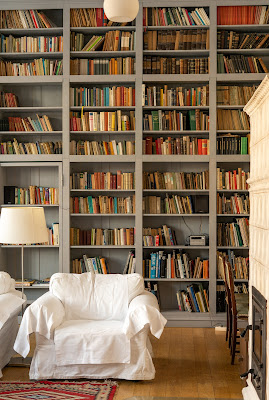Books: stranger, friend, acquaintance?
A Post a Day in May 5/31
I recently came across a useful tip that might help me reduce their number. It involves characterizing each book as friend, acquaintance or stranger.
The method is part Marie Kondo in that you pull all the books off all the shelves. Then sort the books into those three categories and put only those back that are truly worth the shelf space.
Obviously, the friends are those that you read over and over again or, if not that, then those that you feel a bond with for what you once experienced when you read them. In my case, these are my favourites from my childhood that I continue to read when I want familiar story-comfort: the Jill pony books and the Sue Barton nurse books.
Interestingly, the acquaintance category is the biggest one on my shelves: those books that I’m glad to have read and that I like owning, but don’t fall back on routinely for comfort: food writing (think MFK Fisher and Julia Child) and the French Resistance in WWII.
Embarrassingly, the strangers are multiple and miscellaneous. And, oddly, they are the hardest to deal with. The sunk-cost bias comes into play here. Books are not cheap to buy, so, having paid good money for them, tossing them out or passing them along means losing that investment and admitting that the purchase cost was, likely, not worth it. So the hard work involved in packing up the strangers and giving them away is psychological more than anything else. To get over the sunk-cost bias means to stop being hung up on the fact that I paid good money for those strangers (which I maybe haven't even ever read) and to accept that the money is long gone (no amount of regret will bring it back). I could, of course, make the effort to sell the books somewhere, but that requires effort I cannot muster.
Despite my best intentions, I still bring the occasional new book into my house. However, I have Marie Kondo'd a few of my shelves and am moving along a pile of strangers. Maybe one of them could be a 'friend' for you?
———
Land acknowledgement: I respectfully recognize that I live on the original lands of Anishinaabe, Cree, Oji-Cree, Dakota and Dene peoples, and on the homeland of the Métis Nation.
Photo of bookshelves by Jelezniac Bianca on Unsplash





Oh, I love the idea of the "sunk cost bias." I am like this with EVERYTHING I've bought but never used; not only books, but especially books. Thank you for unpacking all the reasons to get rid of them anyway!
ReplyDeleteOver the course of three large moving adventures, I am familiar with the concept of sunk cost, and the practice of pruning the book shelves. But I must say that one of the first books I Marie Kondo'd out of my collection was Marie Kondo.
ReplyDeleteI would have too if I had ever bought one, I'm not a fan of hers.
DeleteThe librarian in me popped out and said. "I wouldn't want to have to wash the slip covers". Thank heaven's for a good library system. I save between $500 and $1200 a year by letting my tax dollars work for me.
ReplyDeleteLibraries are on my mind, too, Coralee. Watch for my musings one day this month...
Delete